Module 11 Way of life 单元综合练(含答案解析)
文档属性
| 名称 | Module 11 Way of life 单元综合练(含答案解析) |
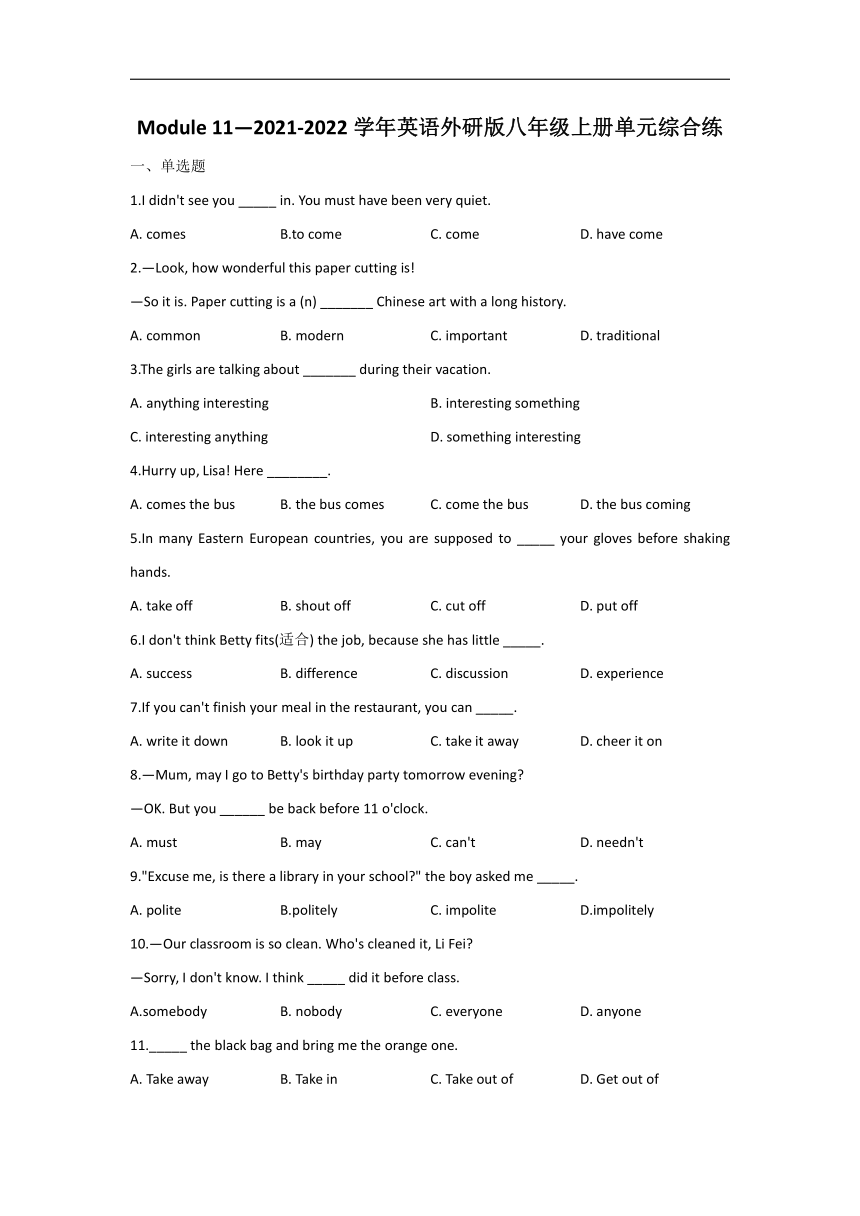
|
|
| 格式 | docx | ||
| 文件大小 | 39.6KB | ||
| 资源类型 | 教案 | ||
| 版本资源 | 外研版 | ||
| 科目 | 英语 | ||
| 更新时间 | 2021-08-14 00:00:00 | ||
图片预览

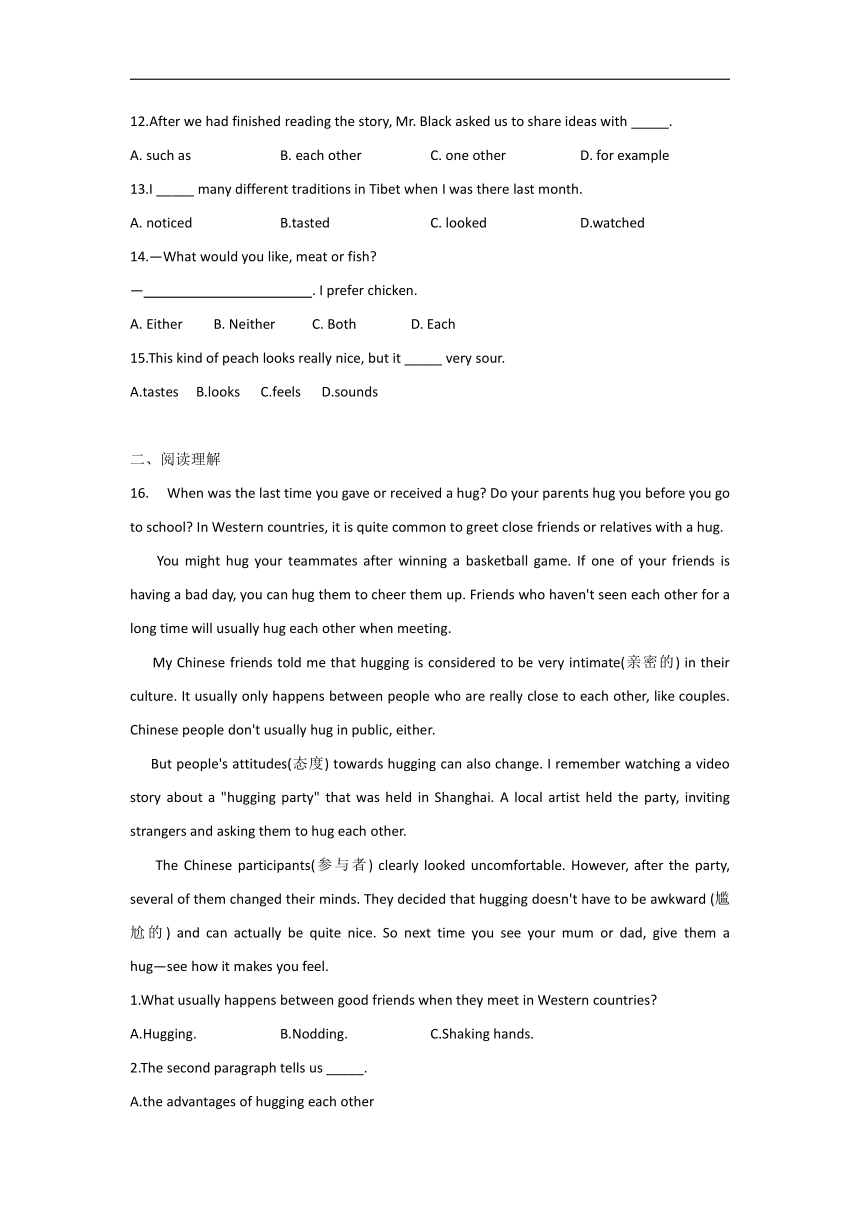
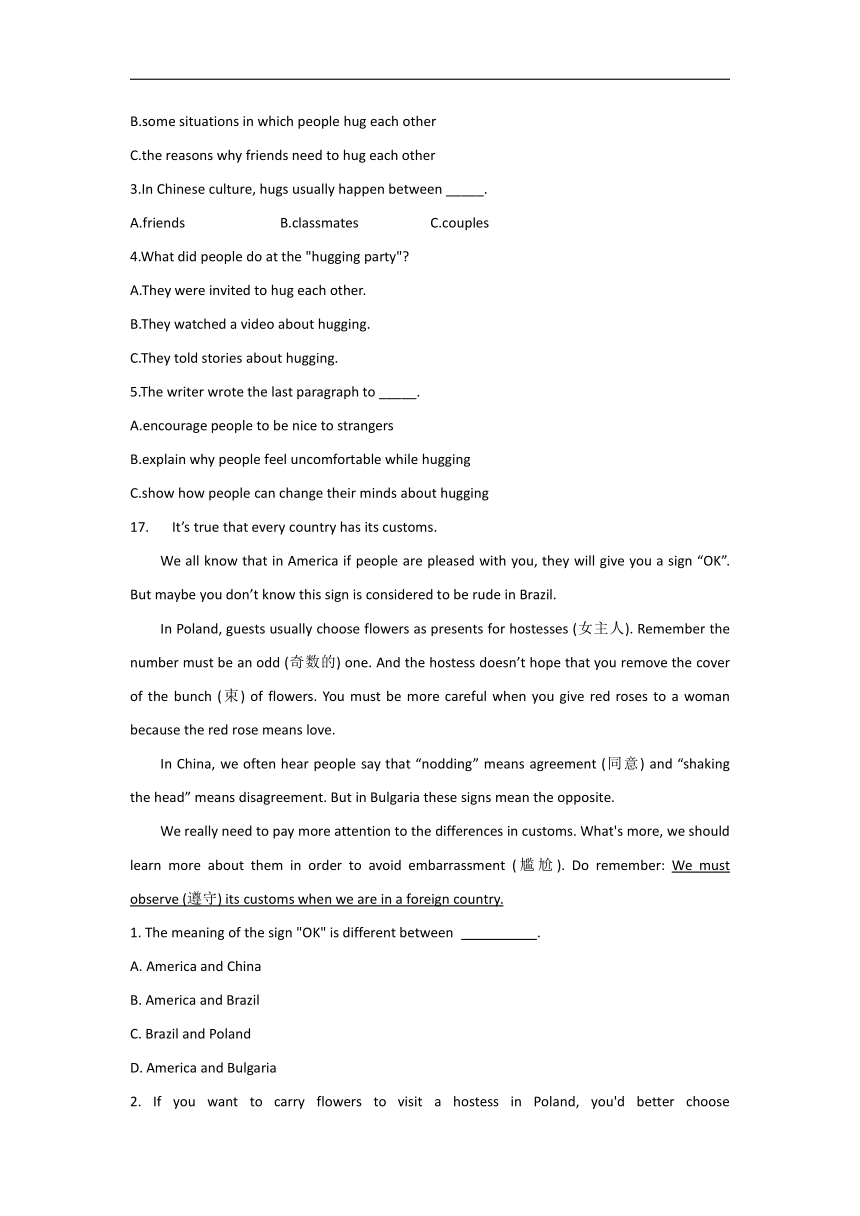
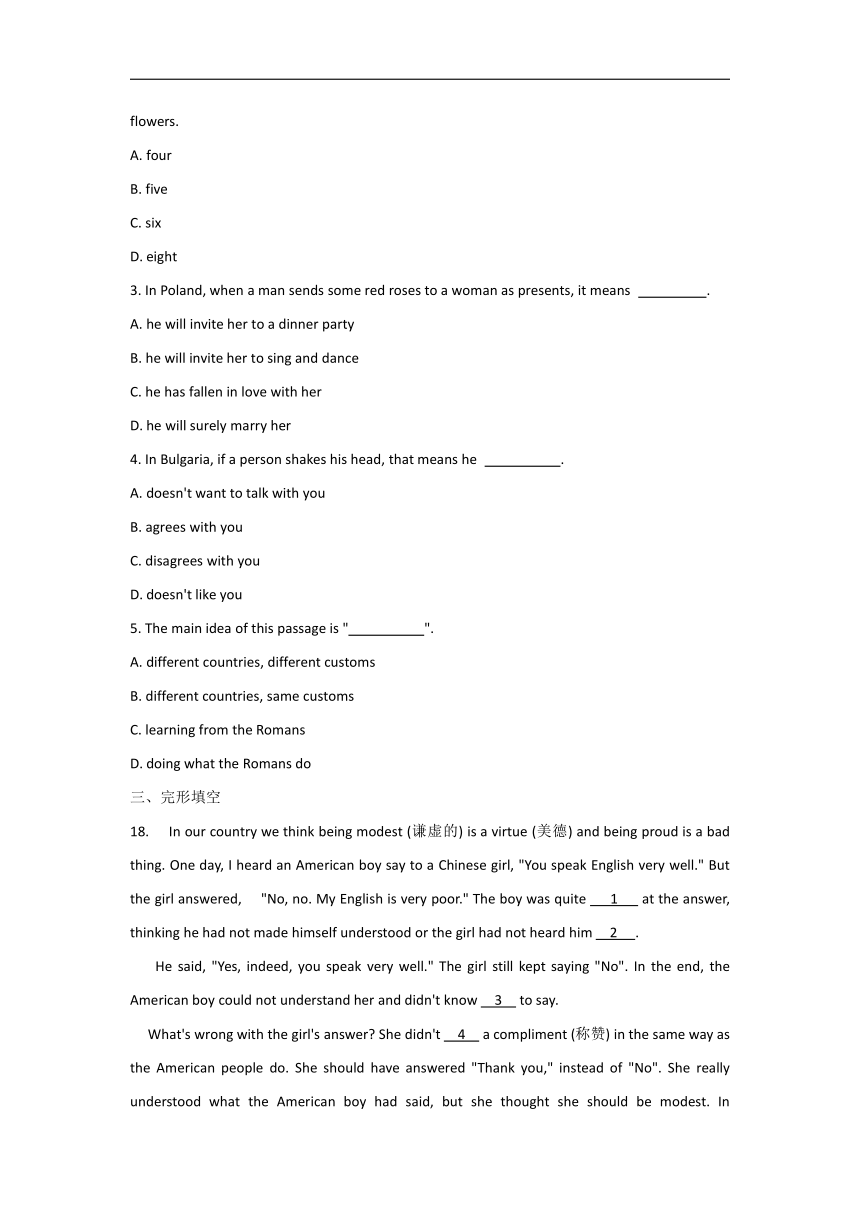
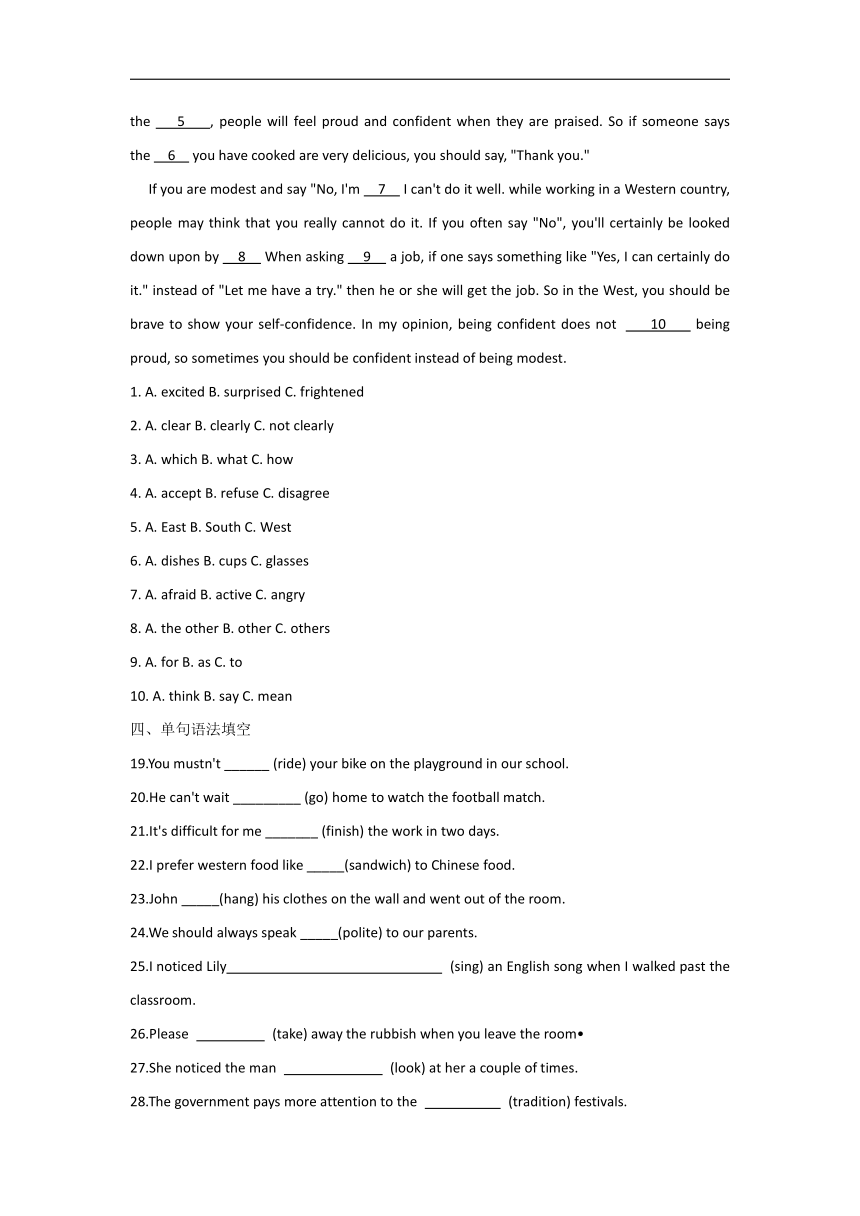
文档简介
Module 11—2021-2022学年英语外研版八年级上册单元综合练
一、单选题
1.I didn't see you _____ in. You must have been very quiet.
A. comes B.to come C. come D. have come
2.—Look, how wonderful this paper cutting is!
—So it is. Paper cutting is a (n) _______ Chinese art with a long history.
A. common B. modern C. important D. traditional
3.The girls are talking about _______ during their vacation.
A. anything interesting B. interesting something
C. interesting anything D. something interesting
4.Hurry up,Lisa! Here ________.
A. comes the bus B. the bus comes C. come the bus D. the bus coming
5.In many Eastern European countries, you are supposed to _____ your gloves before shaking hands.
A. take off B. shout off C. cut off D. put off
6.I don't think Betty fits(适合) the job, because she has little _____.
A. success B. difference C. discussion D. experience
7.If you can't finish your meal in the restaurant, you can _____.
A. write it down B. look it up C. take it away D. cheer it on
8.—Mum, may I go to Betty's birthday party tomorrow evening?
—OK. But you ______ be back before 11 o'clock.
A. must B. may C. can't D. needn't
9."Excuse me, is there a library in your school?" the boy asked me _____.
A. polite B.politely C. impolite D.impolitely
10.—Our classroom is so clean. Who's cleaned it, Li Fei?
—Sorry, I don't know. I think _____ did it before class.
A.somebody B. nobody C. everyone D. anyone
11._____ the black bag and bring me the orange one.
A. Take away B. Take in C. Take out of D. Get out of
12.After we had finished reading the story, Mr. Black asked us to share ideas with _____.
A. such as B. each other C. one other D. for example
13.I _____ many different traditions in Tibet when I was there last month.
A. noticed B.tasted C. looked D.watched
14.—What would you like, meat or fish?
— . I prefer chicken.
A. Either B. Neither C. Both D. Each
15.This kind of peach looks really nice, but it?_____ very sour.
A.tastes?????B.looks??????C.feels??????D.sounds
二、阅读理解
16.??? When was the last time you gave or received a hug? Do your parents hug you before you go to school? In Western countries, it is quite common to greet close friends or relatives with a hug.
??? You might hug your teammates after winning a basketball game. If one of your friends is having a bad day, you can hug them to cheer them up. Friends who haven't seen each other for a long time will usually hug each other when meeting.
??? My Chinese friends told me that hugging is considered to be very intimate(亲密的) in their culture. It usually only happens between people who are really close to each other, like couples. Chinese people don't usually hug in public, either.
??? But people's attitudes(态度) towards hugging can also change. I remember watching a video story about a "hugging party" that was held in Shanghai. A local artist held the party, inviting strangers and asking them to hug each other.
??? The Chinese participants(参与者) clearly looked uncomfortable. However, after the party, several of them changed their minds. They decided that hugging doesn't have to be awkward (尴尬的) and can actually be quite nice. So next time you see your mum or dad, give them a hug—see how it makes you feel.
1.What usually happens between good friends when they meet in Western countries?
A.Hugging. B.Nodding. C.Shaking hands.
2.The second paragraph tells us _____.
A.the advantages of hugging each other
B.some situations in which people hug each other
C.the reasons why friends need to hug each other
3.In Chinese culture, hugs usually happen between _____.
A.friends B.classmates C.couples
4.What did people do at the "hugging party"?
A.They were invited to hug each other.
B.They watched a video about hugging.
C.They told stories about hugging.
5.The writer wrote the last paragraph to _____.
A.encourage people to be nice to strangers
B.explain why people feel uncomfortable while hugging
C.show how people can change their minds about hugging
17. It’s true that every country has its customs.
We all know that in America if people are pleased with you, they will give you a sign “OK”. But maybe you don’t know this sign is considered to be rude in Brazil.
In Poland, guests usually choose flowers as presents for hostesses (女主人). Remember the number must be an odd (奇数的) one. And the hostess doesn’t hope that you remove the cover of the bunch (束) of flowers. You must be more careful when you give red roses to a woman because the red rose means love.
In China, we often hear people say that “nodding” means agreement (同意) and “shaking the head” means disagreement. But in Bulgaria these signs mean the opposite.
We really need to pay more attention to the differences in customs. What's more, we should learn more about them in order to avoid embarrassment (尴尬). Do remember: We must observe (遵守) its customs when we are in a foreign country.
1. The meaning of the sign "OK" is different between .
A. America and China
B. America and Brazil
C. Brazil and Poland
D. America and Bulgaria
2. If you want to carry flowers to visit a hostess in Poland, you'd better choose flowers.
A. four
B. five
C. six
D. eight
3. In Poland, when a man sends some red roses to a woman as presents, it means .
A. he will invite her to a dinner party
B. he will invite her to sing and dance
C. he has fallen in love with her
D. he will surely marry her
4. In Bulgaria, if a person shakes his head, that means he .
A. doesn't want to talk with you
B. agrees with you
C. disagrees with you
D. doesn't like you
5. The main idea of this passage is " ".
A. different countries, different customs
B. different countries, same customs
C. learning from the Romans
D. doing what the Romans do
三、完形填空
18.??? In our country we think being modest (谦虚的) is a virtue (美德) and being proud is a bad thing. One day, I heard an American boy say to a Chinese girl, "You speak English very well." But the girl answered,? "No, no. My English is very poor." The boy was quite???? 1??? ?at the answer, thinking he had not made himself understood or the girl had not heard him?????2??? .
??? He said, "Yes, indeed, you speak very well." The girl still kept saying "No". In the end, the American boy could not understand her and didn't know?????3?????to say.
??? What's wrong with the girl's answer? She didn't?????4?????a compliment (称赞) in the same way as the American people do. She should have answered "Thank you," instead of "No". She really understood what the American boy had said, but she thought she should be modest. In the?????5??? , people will feel proud and confident when they are praised. So if someone says the?????6?????you have cooked are very delicious, you should say, "Thank you."
??? If you are modest and say "No, I'm?????7?????I can't do it well. while working in a Western country, people may think that you really cannot do it. If you often say "No", you'll certainly be looked down upon by?????8?????When asking?????9?????a job, if one says something like "Yes, I can certainly do it." instead of "Let me have a try." then he or she will get the job. So in the West, you should be brave to show your self-confidence. In my opinion, being confident does not ??? 10??? ?being proud, so sometimes you should be confident instead of being modest.
1. A. excited B. surprised C. frightened
2. A. clear B. clearly C. not clearly
3. A. which B. what C. how
4. A. accept B. refuse C. disagree
5. A. East B. South C. West
6. A. dishes B. cups C. glasses
7. A. afraid B. active C. angry
8. A. the other B. other C. others
9. A. for B. as C. to
10. A. think B. say C. mean
四、单句语法填空
19.You mustn't?______ (ride) your bike on the playground in our school.
20.He can't wait _________ (go) home to watch the football match.
21.It's difficult for me?_______ (finish) the work in two days.
22.I prefer western food like _____(sandwich) to Chinese food.
23.John _____(hang) his clothes on the wall and went out of the room.
24.We should always speak _____(polite) to our parents.
25.I noticed Lily (sing) an English song when I walked past the classroom.
26.Please (take) away the rubbish when you leave the room?
27.She noticed the man (look) at her a couple of times.
28.The government pays more attention to the (tradition) festivals.
五、句子翻译
29.在车站,你不准插队上车。
At the bus stop, you?______ ______ ______ ______ onto the bus.
30.有生以来他第一次真正地感到幸福。
_______ _______ _______ _______?in his life he felt truly happy.
31.在公共场合你一定不要大声说话。
You _____ _____ too loudly _____ public.
32.放学后,我会打扫教室。(cleanup)
_____________________________________
33.下午茶不仅仅是喝茶,而且是下午四点左右的一顿 便餐。
Afternoon tea is a drink a light meal at around 4 pm.
六、书面表达
假如你是王昆,你的美国网友Tom对中国的传统节日"春节"非常感兴趣,请你以"My Favourite Festival"为题,写一封邮件,给他做一下介绍。
①?要点包括:节日简介、节日准备、节日活动等。
②?词数要求:100词左右。
?③提示: the Spring Festival, traditional, get together, clean up, be dressed in...
My Favourite Festival
________________________________________________________________________________________________________________________________________________________________________________________________________________________________________________________________________________________________________________________________________
答案以及解析
一、单选题
1.答案:C
解析:see sb. do sth.意为"看见某人做某事",故选C。
2.答案:D
解析:----瞧,这张剪纸是多么的精致啊!----它的确不错。剪纸是一门传统的中国艺术,有着悠久的历史。common"普通的";modern"现代化的";important"重要的";traditional"传统的"。根据"with a long history"可判断这里表示剪纸是中国"传统的"艺术。
3.答案:D
4.答案:A
5.答案:A
解析:句意为:在许多东欧国家,握手前你应该摘下手套。take off , 意为"脱下;脱去(衣物)",符合语境。故选A项。
6.答案:D
解析:句意: 我认为贝蒂不适合这份工作, 因为她没有什么经验。success"成功"; difference"区别"; discussion"讨论"; experience"经验"。结合句意可知选D。
7.答案:C
解析:根据句意"如果你在餐馆里吃不完你点的食物, 你可以_____"可知, 此处用take it away, 意为"带走它"。故选C。
8.答案:A
解析:本题考查情态动词。must意为"一定, 必须"; may意为"或许, 可能"; can't意为"一定不是, 肯定不是"; needn't意为"不需要"。句意: —妈妈, 明天晚上我可以去参加贝蒂的生日聚会吗? —可以。但是你必须在11点之前回来。故选A。
9.答案:B
解析:考查副词的用法。句意: "打扰一下, 你们学校有图书馆吗?" 这个男孩有礼貌地问。这里要用副词修饰动词asked。由excuse me可知要用politely表示"有礼貌地"。故选B。
10.答案:A
解析:考查不定代词的用法辨析。句意: —我们的教室如此干净。李飞, 谁打扫的? —对不起, 我不知道。我想课前有人打扫它了。somebody某人, 有人; nobody没有人; everyone每人, 大家; anyone任何人。故选A。
11.答案:A
解析:考查短语辨析。take away拿走, 带走; take in吸收; take out of从……取出, 拿出; get out of逃避。句意: 拿走这个黑色的包, 给我拿一个橙色的来。故选A。
12.答案:B
解析:考查短语辨析。句意: 我们读完故事之后, 布莱克先生让我们彼此分享一下想法。故选B。
13.答案:A
解析:句意: 上个月当我在西藏的时候, 我注意到了许多不同的风俗传统。notice注意到; taste尝起来; look看起来; watch观看。分析语境, 不同之处应该是被注意到, 故A项符合题意。
14.答案:B
15.答案:A
解析:考查连系动词辨析。句意:这种桃子看起来确实好,但是尝起来非常酸。根据句意可知选A。
二、阅读理解
16.答案:1-5 ABCAC
解析:1.根据短文第一段最后一句"In Western countries, it is quite common to greet close friends or relatives with a hug."可知选A。
2.短文第二段的内容告诉我们人们相互拥抱的一些场合, 故选B。
3.根据短文第三段中"It usually only happens between people who are really close to each other, like couples."可知选C。
4.根据短文第四段最后一句"A local artist held the party, inviting strangers and asking them to hug each other."可知选A。
5.根据短文最后一段内容可推出, 作者写最后一段是为了展示人们是如何改变他们对拥抱的看法的, 故选C。
17.答案:BBCBA
解析:1.细节理解题。根据"We all know that in America if people are pleased with you, they will give you a sign 'OK'. But maybe you don't know this sign is considered to be rude in Brazil."可知, "OK"的手势在美国表示满意,而在巴西被认为是粗鲁的。故选B项。
2.细节理解题。由第三段中的"Remember the number must be an odd one."可知在波兰送花要送奇数,结合选项,只能选B项。
3.细节理解题。根据"You must be more careful when you give red roses to a woman because the red rose means love?" 可知在波兰红色玫瑰意味着爱情。结合选项,故选C项。
4.细节理解题。根据文中的"shaking the head" means disagreement 及"But in Bulgaria these signs mean the opposite." 可知在保加利亚,摇头表示同意。故选B项。
5.主旨大意题。根据文章首句"It's true that every country has its customs."及全文内容可知,本文主要想告诉读者每个国家都有它的风俗,故选A项。
三、完形填空
18.答案:BBBAC AACAC
解析:1.上文提到男孩称赞女孩英文说得很好,而女孩谦虚地回答自己的英文不好。下文表示男孩认为女孩没有理解自己,由此可推断,美国男孩对中国女孩的回答非常吃惊。故选B项。
2.设空处修饰动词,应用副词。根据语境可知,此处表达肯定含义,故选B项。
3.根据语境可知,此处表示"不知道说什么",故用what。
4.句意为: 她没有像美国人那样以同样的方式接受称赞。accept 意为"接受";refuse意为"拒绝";disagree意为"不同意"。联系上下文可知,accept符合语境。故选A项。
5.根据语境可知,此处表示"在西方,当人们被称赞时,他们会感到自豪和自信"。故选C项。
6.根据空后的you have cooked可知此处应选dishes。故选 A项。
7.根据语境可知此处表示"恐怕我做不好"故选A项。
8.此处表示"你肯定会被他人轻视"。others为代词,泛指其他 人,符合语境。故选C项。
9.ask for a job意为"找工作",符合语境,故选A项。
10.句意为:在我看来,自信不意味着自负……mean意为"意味着",符合语境。故选C项。
四、单句语法填空
19.答案:ride
20.答案:to go
21.答案:to finish
22.答案:sandwiches
23.答案:hung
24.答案:politely
25.答案:singing
26.答案:take
解析:分析句子可知,此处是祈使句,应用动词原形。
27.答案:look
解析:notice sb do sth是固定用法,意为"注意到某人做某事", 符合语境。
28.答案:traditional
解析:句意为:政府对传统节日给予更多的关注。此处需要形容词修饰名词festivals,故填traditional,意为"传统的"。
五、句子翻译
29.答案:mustn't push your way/mustn't jump the queue
30.答案:For the first time
31.答案:mustn't talk; in
32.答案:I will clean up the classroom after school.
33.答案:not just; but
六、书面表达
答案:
My Favourite Festival
Dear Wang Kun,
I'm writing to tell you the festival I like best.
The Spring Festival is the most important traditional festival to Chinese people. It is my favourite.
Several days before the New Year, we begin to prepare for it. My parents buy meat, fish and vegetables. Houses are cleaned up.
On the eve of the New Year, the whole family get together and have a big dinner. After the meal we watch TV until twelve o'clock. On the first day of the new year, each of us is dressed in new clothes. When meeting others outside, we say "Happy New Year" to each other. We make new year calls to friends and relatives. That day our parents and relatives give hongbao to us children. All of us have a great time.
一、单选题
1.I didn't see you _____ in. You must have been very quiet.
A. comes B.to come C. come D. have come
2.—Look, how wonderful this paper cutting is!
—So it is. Paper cutting is a (n) _______ Chinese art with a long history.
A. common B. modern C. important D. traditional
3.The girls are talking about _______ during their vacation.
A. anything interesting B. interesting something
C. interesting anything D. something interesting
4.Hurry up,Lisa! Here ________.
A. comes the bus B. the bus comes C. come the bus D. the bus coming
5.In many Eastern European countries, you are supposed to _____ your gloves before shaking hands.
A. take off B. shout off C. cut off D. put off
6.I don't think Betty fits(适合) the job, because she has little _____.
A. success B. difference C. discussion D. experience
7.If you can't finish your meal in the restaurant, you can _____.
A. write it down B. look it up C. take it away D. cheer it on
8.—Mum, may I go to Betty's birthday party tomorrow evening?
—OK. But you ______ be back before 11 o'clock.
A. must B. may C. can't D. needn't
9."Excuse me, is there a library in your school?" the boy asked me _____.
A. polite B.politely C. impolite D.impolitely
10.—Our classroom is so clean. Who's cleaned it, Li Fei?
—Sorry, I don't know. I think _____ did it before class.
A.somebody B. nobody C. everyone D. anyone
11._____ the black bag and bring me the orange one.
A. Take away B. Take in C. Take out of D. Get out of
12.After we had finished reading the story, Mr. Black asked us to share ideas with _____.
A. such as B. each other C. one other D. for example
13.I _____ many different traditions in Tibet when I was there last month.
A. noticed B.tasted C. looked D.watched
14.—What would you like, meat or fish?
— . I prefer chicken.
A. Either B. Neither C. Both D. Each
15.This kind of peach looks really nice, but it?_____ very sour.
A.tastes?????B.looks??????C.feels??????D.sounds
二、阅读理解
16.??? When was the last time you gave or received a hug? Do your parents hug you before you go to school? In Western countries, it is quite common to greet close friends or relatives with a hug.
??? You might hug your teammates after winning a basketball game. If one of your friends is having a bad day, you can hug them to cheer them up. Friends who haven't seen each other for a long time will usually hug each other when meeting.
??? My Chinese friends told me that hugging is considered to be very intimate(亲密的) in their culture. It usually only happens between people who are really close to each other, like couples. Chinese people don't usually hug in public, either.
??? But people's attitudes(态度) towards hugging can also change. I remember watching a video story about a "hugging party" that was held in Shanghai. A local artist held the party, inviting strangers and asking them to hug each other.
??? The Chinese participants(参与者) clearly looked uncomfortable. However, after the party, several of them changed their minds. They decided that hugging doesn't have to be awkward (尴尬的) and can actually be quite nice. So next time you see your mum or dad, give them a hug—see how it makes you feel.
1.What usually happens between good friends when they meet in Western countries?
A.Hugging. B.Nodding. C.Shaking hands.
2.The second paragraph tells us _____.
A.the advantages of hugging each other
B.some situations in which people hug each other
C.the reasons why friends need to hug each other
3.In Chinese culture, hugs usually happen between _____.
A.friends B.classmates C.couples
4.What did people do at the "hugging party"?
A.They were invited to hug each other.
B.They watched a video about hugging.
C.They told stories about hugging.
5.The writer wrote the last paragraph to _____.
A.encourage people to be nice to strangers
B.explain why people feel uncomfortable while hugging
C.show how people can change their minds about hugging
17. It’s true that every country has its customs.
We all know that in America if people are pleased with you, they will give you a sign “OK”. But maybe you don’t know this sign is considered to be rude in Brazil.
In Poland, guests usually choose flowers as presents for hostesses (女主人). Remember the number must be an odd (奇数的) one. And the hostess doesn’t hope that you remove the cover of the bunch (束) of flowers. You must be more careful when you give red roses to a woman because the red rose means love.
In China, we often hear people say that “nodding” means agreement (同意) and “shaking the head” means disagreement. But in Bulgaria these signs mean the opposite.
We really need to pay more attention to the differences in customs. What's more, we should learn more about them in order to avoid embarrassment (尴尬). Do remember: We must observe (遵守) its customs when we are in a foreign country.
1. The meaning of the sign "OK" is different between .
A. America and China
B. America and Brazil
C. Brazil and Poland
D. America and Bulgaria
2. If you want to carry flowers to visit a hostess in Poland, you'd better choose flowers.
A. four
B. five
C. six
D. eight
3. In Poland, when a man sends some red roses to a woman as presents, it means .
A. he will invite her to a dinner party
B. he will invite her to sing and dance
C. he has fallen in love with her
D. he will surely marry her
4. In Bulgaria, if a person shakes his head, that means he .
A. doesn't want to talk with you
B. agrees with you
C. disagrees with you
D. doesn't like you
5. The main idea of this passage is " ".
A. different countries, different customs
B. different countries, same customs
C. learning from the Romans
D. doing what the Romans do
三、完形填空
18.??? In our country we think being modest (谦虚的) is a virtue (美德) and being proud is a bad thing. One day, I heard an American boy say to a Chinese girl, "You speak English very well." But the girl answered,? "No, no. My English is very poor." The boy was quite???? 1??? ?at the answer, thinking he had not made himself understood or the girl had not heard him?????2??? .
??? He said, "Yes, indeed, you speak very well." The girl still kept saying "No". In the end, the American boy could not understand her and didn't know?????3?????to say.
??? What's wrong with the girl's answer? She didn't?????4?????a compliment (称赞) in the same way as the American people do. She should have answered "Thank you," instead of "No". She really understood what the American boy had said, but she thought she should be modest. In the?????5??? , people will feel proud and confident when they are praised. So if someone says the?????6?????you have cooked are very delicious, you should say, "Thank you."
??? If you are modest and say "No, I'm?????7?????I can't do it well. while working in a Western country, people may think that you really cannot do it. If you often say "No", you'll certainly be looked down upon by?????8?????When asking?????9?????a job, if one says something like "Yes, I can certainly do it." instead of "Let me have a try." then he or she will get the job. So in the West, you should be brave to show your self-confidence. In my opinion, being confident does not ??? 10??? ?being proud, so sometimes you should be confident instead of being modest.
1. A. excited B. surprised C. frightened
2. A. clear B. clearly C. not clearly
3. A. which B. what C. how
4. A. accept B. refuse C. disagree
5. A. East B. South C. West
6. A. dishes B. cups C. glasses
7. A. afraid B. active C. angry
8. A. the other B. other C. others
9. A. for B. as C. to
10. A. think B. say C. mean
四、单句语法填空
19.You mustn't?______ (ride) your bike on the playground in our school.
20.He can't wait _________ (go) home to watch the football match.
21.It's difficult for me?_______ (finish) the work in two days.
22.I prefer western food like _____(sandwich) to Chinese food.
23.John _____(hang) his clothes on the wall and went out of the room.
24.We should always speak _____(polite) to our parents.
25.I noticed Lily (sing) an English song when I walked past the classroom.
26.Please (take) away the rubbish when you leave the room?
27.She noticed the man (look) at her a couple of times.
28.The government pays more attention to the (tradition) festivals.
五、句子翻译
29.在车站,你不准插队上车。
At the bus stop, you?______ ______ ______ ______ onto the bus.
30.有生以来他第一次真正地感到幸福。
_______ _______ _______ _______?in his life he felt truly happy.
31.在公共场合你一定不要大声说话。
You _____ _____ too loudly _____ public.
32.放学后,我会打扫教室。(cleanup)
_____________________________________
33.下午茶不仅仅是喝茶,而且是下午四点左右的一顿 便餐。
Afternoon tea is a drink a light meal at around 4 pm.
六、书面表达
假如你是王昆,你的美国网友Tom对中国的传统节日"春节"非常感兴趣,请你以"My Favourite Festival"为题,写一封邮件,给他做一下介绍。
①?要点包括:节日简介、节日准备、节日活动等。
②?词数要求:100词左右。
?③提示: the Spring Festival, traditional, get together, clean up, be dressed in...
My Favourite Festival
________________________________________________________________________________________________________________________________________________________________________________________________________________________________________________________________________________________________________________________________________
答案以及解析
一、单选题
1.答案:C
解析:see sb. do sth.意为"看见某人做某事",故选C。
2.答案:D
解析:----瞧,这张剪纸是多么的精致啊!----它的确不错。剪纸是一门传统的中国艺术,有着悠久的历史。common"普通的";modern"现代化的";important"重要的";traditional"传统的"。根据"with a long history"可判断这里表示剪纸是中国"传统的"艺术。
3.答案:D
4.答案:A
5.答案:A
解析:句意为:在许多东欧国家,握手前你应该摘下手套。take off , 意为"脱下;脱去(衣物)",符合语境。故选A项。
6.答案:D
解析:句意: 我认为贝蒂不适合这份工作, 因为她没有什么经验。success"成功"; difference"区别"; discussion"讨论"; experience"经验"。结合句意可知选D。
7.答案:C
解析:根据句意"如果你在餐馆里吃不完你点的食物, 你可以_____"可知, 此处用take it away, 意为"带走它"。故选C。
8.答案:A
解析:本题考查情态动词。must意为"一定, 必须"; may意为"或许, 可能"; can't意为"一定不是, 肯定不是"; needn't意为"不需要"。句意: —妈妈, 明天晚上我可以去参加贝蒂的生日聚会吗? —可以。但是你必须在11点之前回来。故选A。
9.答案:B
解析:考查副词的用法。句意: "打扰一下, 你们学校有图书馆吗?" 这个男孩有礼貌地问。这里要用副词修饰动词asked。由excuse me可知要用politely表示"有礼貌地"。故选B。
10.答案:A
解析:考查不定代词的用法辨析。句意: —我们的教室如此干净。李飞, 谁打扫的? —对不起, 我不知道。我想课前有人打扫它了。somebody某人, 有人; nobody没有人; everyone每人, 大家; anyone任何人。故选A。
11.答案:A
解析:考查短语辨析。take away拿走, 带走; take in吸收; take out of从……取出, 拿出; get out of逃避。句意: 拿走这个黑色的包, 给我拿一个橙色的来。故选A。
12.答案:B
解析:考查短语辨析。句意: 我们读完故事之后, 布莱克先生让我们彼此分享一下想法。故选B。
13.答案:A
解析:句意: 上个月当我在西藏的时候, 我注意到了许多不同的风俗传统。notice注意到; taste尝起来; look看起来; watch观看。分析语境, 不同之处应该是被注意到, 故A项符合题意。
14.答案:B
15.答案:A
解析:考查连系动词辨析。句意:这种桃子看起来确实好,但是尝起来非常酸。根据句意可知选A。
二、阅读理解
16.答案:1-5 ABCAC
解析:1.根据短文第一段最后一句"In Western countries, it is quite common to greet close friends or relatives with a hug."可知选A。
2.短文第二段的内容告诉我们人们相互拥抱的一些场合, 故选B。
3.根据短文第三段中"It usually only happens between people who are really close to each other, like couples."可知选C。
4.根据短文第四段最后一句"A local artist held the party, inviting strangers and asking them to hug each other."可知选A。
5.根据短文最后一段内容可推出, 作者写最后一段是为了展示人们是如何改变他们对拥抱的看法的, 故选C。
17.答案:BBCBA
解析:1.细节理解题。根据"We all know that in America if people are pleased with you, they will give you a sign 'OK'. But maybe you don't know this sign is considered to be rude in Brazil."可知, "OK"的手势在美国表示满意,而在巴西被认为是粗鲁的。故选B项。
2.细节理解题。由第三段中的"Remember the number must be an odd one."可知在波兰送花要送奇数,结合选项,只能选B项。
3.细节理解题。根据"You must be more careful when you give red roses to a woman because the red rose means love?" 可知在波兰红色玫瑰意味着爱情。结合选项,故选C项。
4.细节理解题。根据文中的"shaking the head" means disagreement 及"But in Bulgaria these signs mean the opposite." 可知在保加利亚,摇头表示同意。故选B项。
5.主旨大意题。根据文章首句"It's true that every country has its customs."及全文内容可知,本文主要想告诉读者每个国家都有它的风俗,故选A项。
三、完形填空
18.答案:BBBAC AACAC
解析:1.上文提到男孩称赞女孩英文说得很好,而女孩谦虚地回答自己的英文不好。下文表示男孩认为女孩没有理解自己,由此可推断,美国男孩对中国女孩的回答非常吃惊。故选B项。
2.设空处修饰动词,应用副词。根据语境可知,此处表达肯定含义,故选B项。
3.根据语境可知,此处表示"不知道说什么",故用what。
4.句意为: 她没有像美国人那样以同样的方式接受称赞。accept 意为"接受";refuse意为"拒绝";disagree意为"不同意"。联系上下文可知,accept符合语境。故选A项。
5.根据语境可知,此处表示"在西方,当人们被称赞时,他们会感到自豪和自信"。故选C项。
6.根据空后的you have cooked可知此处应选dishes。故选 A项。
7.根据语境可知此处表示"恐怕我做不好"故选A项。
8.此处表示"你肯定会被他人轻视"。others为代词,泛指其他 人,符合语境。故选C项。
9.ask for a job意为"找工作",符合语境,故选A项。
10.句意为:在我看来,自信不意味着自负……mean意为"意味着",符合语境。故选C项。
四、单句语法填空
19.答案:ride
20.答案:to go
21.答案:to finish
22.答案:sandwiches
23.答案:hung
24.答案:politely
25.答案:singing
26.答案:take
解析:分析句子可知,此处是祈使句,应用动词原形。
27.答案:look
解析:notice sb do sth是固定用法,意为"注意到某人做某事", 符合语境。
28.答案:traditional
解析:句意为:政府对传统节日给予更多的关注。此处需要形容词修饰名词festivals,故填traditional,意为"传统的"。
五、句子翻译
29.答案:mustn't push your way/mustn't jump the queue
30.答案:For the first time
31.答案:mustn't talk; in
32.答案:I will clean up the classroom after school.
33.答案:not just; but
六、书面表达
答案:
My Favourite Festival
Dear Wang Kun,
I'm writing to tell you the festival I like best.
The Spring Festival is the most important traditional festival to Chinese people. It is my favourite.
Several days before the New Year, we begin to prepare for it. My parents buy meat, fish and vegetables. Houses are cleaned up.
On the eve of the New Year, the whole family get together and have a big dinner. After the meal we watch TV until twelve o'clock. On the first day of the new year, each of us is dressed in new clothes. When meeting others outside, we say "Happy New Year" to each other. We make new year calls to friends and relatives. That day our parents and relatives give hongbao to us children. All of us have a great time.
同课章节目录
- Module 1 How to learn English
- Unit 1 Let's try to speak English as much as possi
- Unit 2 You should smile at her.
- Unit 3 Language in use .
- Module 2 My home town and my country
- Unit 1 It's taller than many other buildings.
- Unit 2 Cambridge is a beautiful city in the east o
- Unit 3 Language in use .
- Module 3 Sports.
- Unit 1 Nothing is more exciting than playing tenni
- Unit 2 This year we training more carefully.
- Unit 3 Language in use .
- Module 4 Planes, ships and trains .
- Unit 1 He lives the farthest from school.
- Unit 2 What is the best way to travel.
- Unit 3 Language in use .
- Module 5 Lao She Teahouse.
- Unit 1 I wanted to see the Beijing Opera.
- Unit 2 It descibes the changes in Chinese society.
- Unit 3 Language in use .
- Module 6 Animals in danger.
- Unit 1 It allows people to get closer to them .
- Unit 2 The WWF is working hard to save them all.
- Unit 3 Language in use .
- Revision module A
- Module 7 A famous story
- Unit 1 Alice was sitting with her sister by the ri
- Unit 2 She was thinking about her cat.
- Unit 3 Language in use .
- Module 8 Accidents
- Unit 1 While the car were changing to red, a car s
- Unit 2 I was trying to pick it up when it bite me
- Unit 3 Language in use .
- Module 9 Population
- Unit 1 The population of China is about 1.37 billi
- Unit 2 Arnwick was a city with 200,000 people.
- Unit 3 Language in use .
- Module 10 The weathe
- Unit 1 It might snow.
- Unit 2 The weather is fine all year round.
- Unit 3 Language in use .
- Module 11 Way of life
- Unit 1 In China ,we open a gift later.
- Unit 2 In England, you usually drink tea with milk
- Unit 3 Language in use .
- Module 12 Help
- Unit 1 What should we do before help arrives?
- Unit 2 Stay away from windows and heavy furniture.
- Unit 3 Language in use .
- Revision module B
